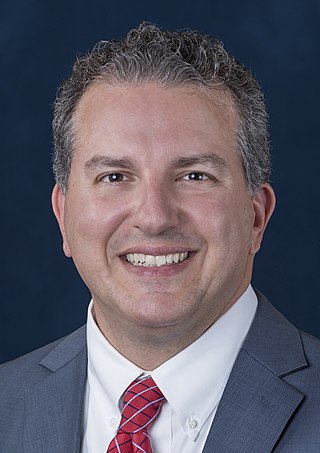Related Research Articles

Insurance is a means of protection from financial loss in which, in exchange for a fee, a party agrees to compensate another party in the event of a certain loss, damage, or injury. It is a form of risk management, primarily used to protect against the risk of a contingent or uncertain loss.

Reinsurance is insurance that an insurance company purchases from another insurance company to insulate itself from the risk of a major claims event. With reinsurance, the company passes on ("cedes") some part of its own insurance liabilities to the other insurance company. The company that purchases the reinsurance policy is referred to as the "ceding company" or "cedent". The company issuing the reinsurance policy is referred to as the "reinsurer". In the classic case, reinsurance allows insurance companies to remain solvent after major claims events, such as major disasters like hurricanes or wildfires. In addition to its basic role in risk management, reinsurance is sometimes used to reduce the ceding company's capital requirements, or for tax mitigation or other purposes.

Zurich Insurance Group Ltd is a Swiss insurance company, headquartered in Zürich, and the country's largest insurer. As of 2021, the group is the world's 112th largest public company according to Forbes' Global 2000s list, and in 2011, it ranked 94th in Interbrand's top 100 brands.
Guarantee Security Life Insurance Company, or GSLIC, represented one of the most severe cases of insurance fraud in Florida history. According to the Florida Insurance Commissioner:
[GSLIC] was, almost from the beginning, a massive fraud, aided and abetted by blue-ribbon brokers and licensed professionals motivated by their own self-interest. The fraud at Guaranteed Security was a carefully orchestrated bank robbery. But the thieves disguised themselves with the help of accountants and brokers and lawyers rather than wearing silk-stocking masks.

The chief financial officer of Florida is an elected statewide constitutional officer of Florida. The office was created in 2002 following the 1998 reforms of the Florida Cabinet. The CFO is a combination of the former offices of comptroller and treasurer/insurance commissioner/fire marshal. The office heads the Florida Department of Financial Services and is responsible for overseeing the state's finances, collecting revenue, paying state bills, auditing state agencies, regulating cemeteries and funerals, and handling fires and arsons. In addition, the CFO has administrative oversight over the offices which handles banking and insurance regulation. The CFO is a member of the Cabinet is third in the line of succession to the office of Governor of Florida.

Compagnie Française d'Assurance pour le Commerce Extérieur (Coface) is a credit insurer that operates worldwide' in addition to offering debt collection services, factoring and business information, and bonds.
Insurance law is the practice of law surrounding insurance, including insurance policies and claims. It can be broadly broken into three categories - regulation of the business of insurance; regulation of the content of insurance policies, especially with regard to consumer policies; and regulation of claim handling wise.
Solvency II Directive 2009 is a Directive in European Union law that codifies and harmonises the EU insurance regulation. Primarily this concerns the amount of capital that EU insurance companies must hold to reduce the risk of insolvency.
Bond insurance, also known as "financial guaranty insurance", is a type of insurance whereby an insurance company guarantees scheduled payments of interest and principal on a bond or other security in the event of a payment default by the issuer of the bond or security. It is a form of "credit enhancement" that generally results in the rating of the insured security being the higher of (i) the claims-paying rating of the insurer or (ii) the rating the bond would have without insurance.
Executive Life Insurance Company (ELIC) was once the largest life insurance company in California. Its financial problems and subsequent insolvency in April 1991 shocked its policyholders and the financial world.
The New York State Insurance Department (NYSID) was the state agency responsible for supervising and regulating all insurance business in New York State. It was regarded in the industry as one of the most state-of-the-art insurance regulatory agencies.
Insurance in the United States refers to the market for risk in the United States, the world's largest insurance market by premium volume. According to Swiss Re, of the $6.861 trillion of global direct premiums written worldwide in 2021, $2.719 trillion (39.6%) were written in the United States.

Reliance Insurance Company, now officially known as Reliance Insurance Company [in Liquidation], was founded in Philadelphia in 1817 and has undergone numerous corporate makeovers in the intervening years. As of October 3, 2001, the company has been in liquidation. As of 2020, Reliance was still in liquidation.
Blue Cross and Blue Shield of Alabama (BCBSAL) is a nonprofit health insurance company headquartered in Birmingham, Alabama. The company was founded in 1936, provides coverage to more than 3 million people and is a member of the Blue Cross and Blue Shield Association (BCBS). BCBSAL employs nearly 5,000 people, which includes almost 3,500 people at its corporate headquarters in Birmingham. The company also operates Cahaba Government Benefit Administrators and Cahaba Safeguard Administrators, both headquartered in Birmingham. It commands over 90 percent of the health insurance market in Alabama, a state with half a million uninsured people, one of the highest uninsured rates in the nation at 10 percent of the population.

Citizens Property Insurance Corporation (Citizens) was created in 2002 from the merger of two other entities to provide both windstorm coverage and general property insurance for home-owners who could not obtain insurance elsewhere. It was established by the Florida Legislature in Chapter 627.351(6) Florida Statutes as a not-for-profit insurer of last resort, headquartered in Tallahassee, Florida, and quickly became the largest insurer in the state. The company has no connection to Louisiana Citizens Property Insurance Corporation, the equivalent entity in Louisiana, or several similarly named "for-profit" subsidiaries in the Hanover Insurance Group.
Assuris is a nonprofit organization under Canadian federal regulation to protect policyholders of life insurance instruments if a life insurance company becomes insolvent. It is designed to allow a block of policies to be transferred to a solvent company in which the policies will continue to be honoured. The Office of the Superintendent of Financial Institutions states, "Assuris' mission is to mitigate the impact on Canadian policyholders of the financial failure of a life insurance company."
Univé is a cooperative insurance company in the Netherlands. Univé presents itself as a nonprofit insurer, to express that making profit is not important and therefore has cheaper products.
The Nonadmitted and Reinsurance Reform Act of 2010 is a United States law regulating the sale of insurance in states where the insurer is usually not authorized to sell insurance. It prevents states other than the home state of a U.S. insurance company from imposing regulations or taxes on the sale of nonadmitted insurance.
Property and casualty insurance guaranty funds are part of the property and casualty guaranty fund system, a non-profit, state-based, statutorily-created insurance consumer protection system that protects policyholders if an insurer goes bankrupt.
Guaranty associations are organizations which guarantee insurance policies in the event of an insolvency event.
References
- ↑ NOLHGA web site, retrieved September 16, 2008
- 1 2 3 "About Us". Herndon, VA: National Organization of Life and Health Insurance Guaranty Associations. Retrieved 2009-11-16.
- ↑ "Policyholder Information". National Organization of Life and Health Insurance Guaranty Associations. Retrieved 2009-11-16.
- ↑ "The Insolvency Process". National Organization of Life and Health Insurance Guaranty Associations. Retrieved 2009-11-16.
- ↑ Chizoba, Morah. "Investopedia Q&A". Investopedia.com . Retrieved 2009-11-16.